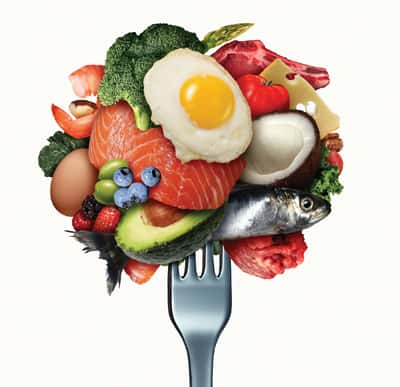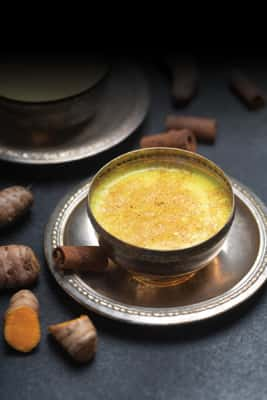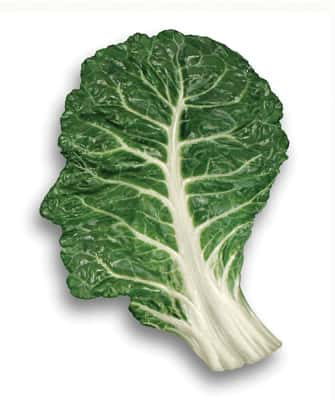5 Tips for Sustainable Eating
What you put on your plate has a big impact on the environment. Eating healthfully and sustainably go hand-in-hand, meaning it’s possible to develop sustainable eating practices that improve your health while benefiting the health of the planet. Following are five tips from the Nutrition Source at the Harvard T.H. Chan School of Public Health.
1. Prioritize plants. By filling half your plate with vegetables and fruits as part of a healthy diet, you help reduce freshwater withdrawals (total water withdrawals, not counting evaporation from storage basins) and deforestation—a win-win for personal health and the environment.
2. Minimize meat. Treat meat more as a condiment than a main dish. Meat production is a significant contributor to greenhouse gas emissions (especially beef production), and the environmental burden deepens, as raising and transporting livestock also requires more food, water, land and energy than plants. Another good strategy is to choose non-meat proteins such as nuts and legumes.
3. Select new seafood. Fish is a healthy choice, but some species are at risk of being overfished, or produced in ways that harm the marine environment. If your go-to variety of fish is on the “avoid” list, consider trying something new.
4. Buy local. Explore farmers markets when buying fresh produce and meet the people who produce your food.
5. Eat mindfully. Focusing on what you’re eating allows you to reflect on where your food comes from and how it’s nourishing your body. By paying more attention to how we eat and thinking about the big picture, you may alter food consumption and reduce food waste.
green.harvard.edu
The Pace of Plogging Picks Up
 Have you noticed people picking up trash while they’re outside jogging? Or, they’re carrying a collection of old plastic bottles? “Plogging”—the Swedish fitness craze for people who want to save the planet while they’re out jogging—is making its way to the U.S. The term is a mash-up of jogging and the Swedish term plocka upp, which means pick up. And in this case, it’s litter.
Have you noticed people picking up trash while they’re outside jogging? Or, they’re carrying a collection of old plastic bottles? “Plogging”—the Swedish fitness craze for people who want to save the planet while they’re out jogging—is making its way to the U.S. The term is a mash-up of jogging and the Swedish term plocka upp, which means pick up. And in this case, it’s litter.
Across Europe, there are plogging groups in Scandinavia, Germany and beyond. In the U.S., it’s just starting to catch on among exercisers who are fed up with litter along their routes. According to the Swedish-based fitness app, Lifesum, which made it possible for users to track plogging activity, a half-hour of jogging plus picking up trash burns 288 calories for the average person, compared with the 235 calories burned by jogging alone. A brisk walk expends about 120 calories.
thewashingtonpost.com
Did You Know?
On average, Americans consume 36.4 gallons of bottled water per person every year. That adds up to about 1.7 billion half-liter bottles. All of these bottles are manufactured, and then end up somewhere when empty. The massive consumption of bottled water requires huge amounts of resources to be created, then shipped across the country in trucks, trains and by boat. This depletes natural resources and puts a strain on the environment. Where do all the plastic bottles go when they’re empty? Some are recycled, but billions either end up in landfills or are incinerated, which also takes a toll on the environment.
Power Up with Golden Milk
 Golden milk is a traditional Indian drink made with turmeric, which gives it a yellow-gold hue. Also known as “turmeric milk,” the drink is made with a plant-based milk such as almond or coconut, and includes turmeric, cinnamon and ginger. Many of these spices contain antioxidants, or have anti-inflammatory properties, which offers the following health benefits:
Golden milk is a traditional Indian drink made with turmeric, which gives it a yellow-gold hue. Also known as “turmeric milk,” the drink is made with a plant-based milk such as almond or coconut, and includes turmeric, cinnamon and ginger. Many of these spices contain antioxidants, or have anti-inflammatory properties, which offers the following health benefits:
Reduces inflammation. This helps prevent or manage conditions such as heart disease, cancer, arthritis and Alzheimer’s disease.
Prevents cell damage. Curcumin also has antioxidant properties. Some studies show that antioxidants can help repair cell damage in the body and help reduce the risk of many illnesses.
Improves your mood. Evidence suggests curcumin can help improve mood in people who consume it regularly.
Supports brain function. Some older studies suggest that turmeric may help improve brain function, but more research is necessary to fully prove its effectiveness.
Boosts the immune system. A review of research found that curcumin contains antibacterial, antiviral and antifungal properties that can help better fight infections. Ginger and cinnamon are common home remedies for colds and flus.
Aids digestion. The ginger in golden milk may help aid digestion. Ginger is also a common home remedy for nausea and vomiting.
medicalnewstoday.com
Best Foods for Brain Power
Just as there’s no magic pill to prevent cognitive decline, no single brain food can ensure a sharp mind as you age. According to nutritionists, the most important strategy is to follow a healthy dietary pattern that includes lots of fruits, vegetables, legumes and whole grains. Try to get protein from plant sources and fish, and choose healthy fats such as olive and canola oil.
 Certain foods are rich in healthful components such as omega-3 fatty acids, B vitamins and antioxidants, which are known to support brain health. By adding them to your diet regularly, they can help boost brain health, translating into better cognitive function. Research shows that the best brain foods are the same ones that protect your heart and blood vessels. They include:
Certain foods are rich in healthful components such as omega-3 fatty acids, B vitamins and antioxidants, which are known to support brain health. By adding them to your diet regularly, they can help boost brain health, translating into better cognitive function. Research shows that the best brain foods are the same ones that protect your heart and blood vessels. They include:
Green, leafy vegetables. Leafy greens such as kale, spinach, collards and broccoli are rich in brain healthy nutrients such as vitamin K, lutein, folate and beta carotene. Research suggests these plant-based foods may help slow cognitive decline.
Fatty fish. Abundant sources of omega-3 fatty acids, fatty fish provide healthy unsaturated fats that are linked to lower blood levels of beta-amyloid—the protein that forms damaging clumps in the brains of people with Alzheimer’s diseases. Try to eat fish twice a week. Salmon, cod, canned light tuna and pollack are good choices. If you’re not a fan of fish, ask your doctor about taking an omega-3 supplement.
Tea and coffee. The caffeine in your morning cup of coffee or tea might offer more than just a short-term concentration boost. In a study published by The Journal of Nutrition, participants with higher caffeine consumption scored better on tests gauging mental function. Caffeine might also solidify new memories, according to other research.
Walnuts. Nuts are excellent sources of protein and healthy fats, and walnuts in particular might also improve memory. A study from UCLA linked higher walnut consumption to improved cognitive test scores. Walnuts are high in a type of omega-3 fatty acid called alpha-linolenic acid (ALA), which helps lower blood pressure and protect arteries.
health.harvard.edu




